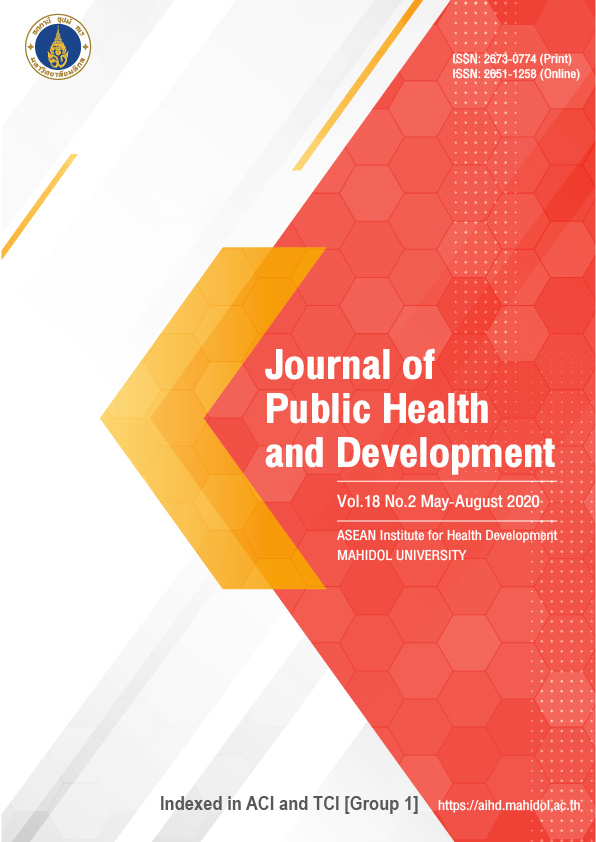Effectiveness of a health literacy enhancement program for caregivers of dependent older persons in a community of the Northern Part, Thailand
Main Article Content
Abstract
Caregivers play an important role in helping dependent older persons in their daily activities. Caregivers with advanced health literacy are able to apply their healthcare practices skillfully and search for quality information that will supplement their caregiving skills and improve older persons’ quality of life. Many previous researches have shown that caregivers of the elderly do not have enough health literacy, which directly affects the quality of the care they provide. This research aims to assess the effectiveness of a health literacy enhancement program for caregivers of dependent older persons. A quasi-experimental study design was used with an intervention group (n = 22) and a control group (n = 22). The total sample size was 44. The intervention group received the health literacy enhancement program for 12 weeks, during which the researcher conducted workshops and a weekly three-hour training session covering important topics. The results showed that the mean score of the health literacy and caregiving behavior for dependent older persons of the intervention group was higher than the control group after the program, and that the difference was statistically significant (p<.001). The better scores were the result of the program’s active learning activities in which the learners participated and learned to share their knowledge among group members. In summary, the findings suggest a health literacy enhancement program should be used to promote health literacy and change caregiving behavior for dependent older persons in a community.
Article Details

This work is licensed under a Creative Commons Attribution-NonCommercial-NoDerivatives 4.0 International License.
References
National Statistical Office Thailand. The survey of Thai elderly population, https://www.m-society.go.th/article_attach/14494/18145.pdf, 2014 [accessed 10 October 2019].
Ministry of Social Development and Human Security. Elderly population in Thailand: present and future,
http://www.dop.go.th/download/knowledge/knowledge_th_20160106135752_1.pdf , 2015 [accessed 21 November 2019].
Suwimolrat R. Predictors of Health Care behaviors for the Elderly among Caregivers in Warinchamrap District, Ubonratchathani Province. Journal of Nursing, Public Health, and Education. 2016;17(2), 71-84. [Thai]
Wilson, TD. Human information behaviors. Informing Sci, 2000; 3(2), 49-55.
Barsevick AM, Johnson JE. Preference for information and involvement, information seeking and emotional responses of women undergoing colposcopy. Res Nurs Health. 1990;13(1):1–7
Pornchita U. Online Health Information Seeking Behavior of Elders. Phranakhon Rajabhat Research Journal (Humanities and Social Sciences). 2016;11(1):252-61. [Thai]
Yuen EYN, Dodson S, Batterham RW, Knight T, Chirgwin J, Livingston PM. Development of a conceptual model of cancer caregiver health literacy. Eur J Cancer Care. 2015;25(2):294–306.
Nielsen-Bohlman L, Panzer A, Kindig D. Health literacy: A prescription to end confusion. Washington, DC: National Academies Press, U.S. Department of Health and Human Services. 2004
Smith PD, Martin B, Chewning B, Hafez S, Leege E, Renken J, et al. Improving health care communication for caregivers: A pilot study. Gerontol & Geriatr Educ. 2016;39(4):433–44.
Nutbeam D. Health literacy as a public health goal: a challenge for contemporary health education and communication strategies into the 21st century. Health Promot Int. 2000;15(3), 259-267.
Wagner C, Knight K, Steptoe A, Wardle J. Functional health literacy and health-promoting behavior in a national sample of British adults. J Epidemiol Commun H. 2007;61(12):1086–90.
Cho YI Lee S-YD, Arozullah AM, Crittenden KS. Effects of health literacy on health status and health service utilization amongst the elderly. Soc Sci Med. 2008;66(8):1809–16.
Gladdar SF, Valerio MA, Garcia CM, Hansen L. Adolescent health literacy: the importance of credible sources for online health information. J Sch Health. 2012;82(1):28-36.
World Health Organization. Health literacy and health promotion: definitions, concepts and examples in the Eastern Mediterranean Region. Individual empowerment conference working document, https://www.dors.it/documentazione/testo/201409/02_2009_OMS%20Nairobi_Health%20Literacy.pdf [accessed 10 November 2019].
Bonwell CC, Eison JA. Active Learning: Creating Excitement in the Classroom. Washington, D.C.: The George Washington University, School of Education and Human Development; 1991.
Kamanee T. Science of teaching. Bangkok: Chulalongkorn University Publishing; 2011. [Thai]
Nutbeam D. 2008. The evolving concept of health literacy. Soc sci Med, 66(8): 1809-16
Ferguson LA. Implementing a Video Education Program to Improve Health Literacy. J Nurse Pract. 2012;8(8):17–22.
Tuanjai S, Ganoksri J. Development of a Community Health and Behavior Modifying System for Family’s Care Giver with Health Network Center,Bangpakong Districts. Princess of Naradhiwas University Journal. 2018; 11(1): 11-24 [Thai]
Cianfrocca C, Caponnetto V, Donati D, Lancia L, Tartaglini D, Stasio ED. The effects of a multidisciplinary education course on the burden, health literacy and needs of family caregivers. Appl Nurs Res. 2018; 44:100–6.
Uemura K, Yamada M, Okamoto H. Effects of Active Learning on Health Literacy and Behavior in Older Adults: A Randomized Controlled Trial. J Am Geriatr Soc. 2018;66(9):1721–9.
Bevan JL, Pecchioni LL. Understanding the impact of family caregiver cancer literacy on patient health outcomes. Patient Educ Couns. 2008; 71(3), 356–64.
Chin J, Morrow DG, Stine-Morrow EA, Connner-Garcia T, Graumlich, JF, Murray MD. The process-knowledge model of health literacy: evidence from acomponential analysis of two commonly used measures. J Health Commun. 2011; 16, 222-41.
Rungnapa A, Sutheera H, Sasitorn R. The Effects of Health Literacy Enhancement Program on Hypertensive Prevention Behaviorof Pre-hypertension Risk Group at a Communityin Nakhon Pathom Province. Royal Thai Navy Medical Journal, 2019; 45(3), 509-20. [Thai]
Suree S, Pannee B. Effects of health literacy promoting programs and exercise by applying maneewachexercise for preventing fall in older adult inburiram province, ournal of HealthEducation, 2019; 42(2), 149-58. [Thai]
Kritsapon T, Sutteeporn M, Napaphen J. Effectiveness of a Health Literacy Developmental Program in Patients with Uncontrolled Hypertension. Boromarajonani College of Nursing, Uttaradit Journal ,2019; 11(1), 197-21. [Thai]
Nahm ES, Resnick B, Orwig D, Magaziner J, Bellantoni M, Sterling R, Brennan PF. A theory-based online hip fracture resource center for caregivers: effects on dyads. Nurs Res. 2012; 61(6), 413-22
Metin S, Demirci H, Metin AT. Effect of health literacy of caregivers on survival rates of patients under palliative care. Scand J Caring Sci. 2019; 33(3), 669-76.


